Lasting Impressions
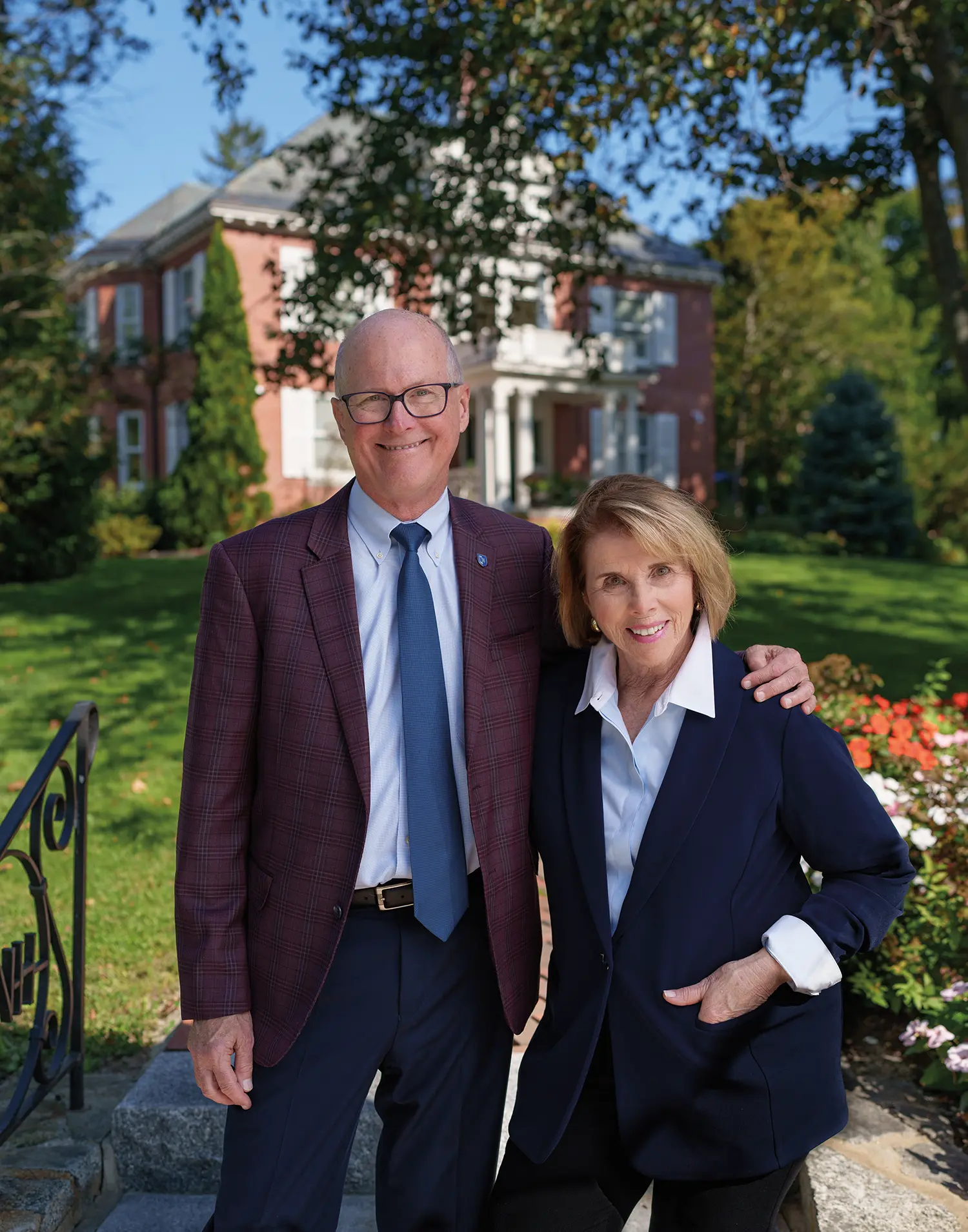

As the six-year tenure of President James W. Dean Jr. came to a close, community members reflected on his unprecedented presidency
Story By
Ali Goldstein
It is July 4, 2018. James W. Dean Jr. has just arrived in Durham to begin his new role: the 20th president of the University of New Hampshire. When he walks into town to find something for dinner, everything is closed for the holiday. He stumbles upon a little mart off Main Street that is, against all odds, open. As he pulls his wallet out of his pocket to pay, the proprietor looks right at him, recognizes the university’s new president and says, “It’s on the house.”
Later, fireworks light up the Seacoast, an auspicious beginning. For Dean, it marks the start of his six years as UNH president, stewarding the university through a period of great challenge and change, but also progress and potential.
Dean’s story as president of UNH needs to have a wide aperture, because it isn’t just about him. There are many individuals who made a difference to his tenure and whom he impacted in return. This is a narrative populated with some of those voices — and their shared desire to leave this place better than they found it.

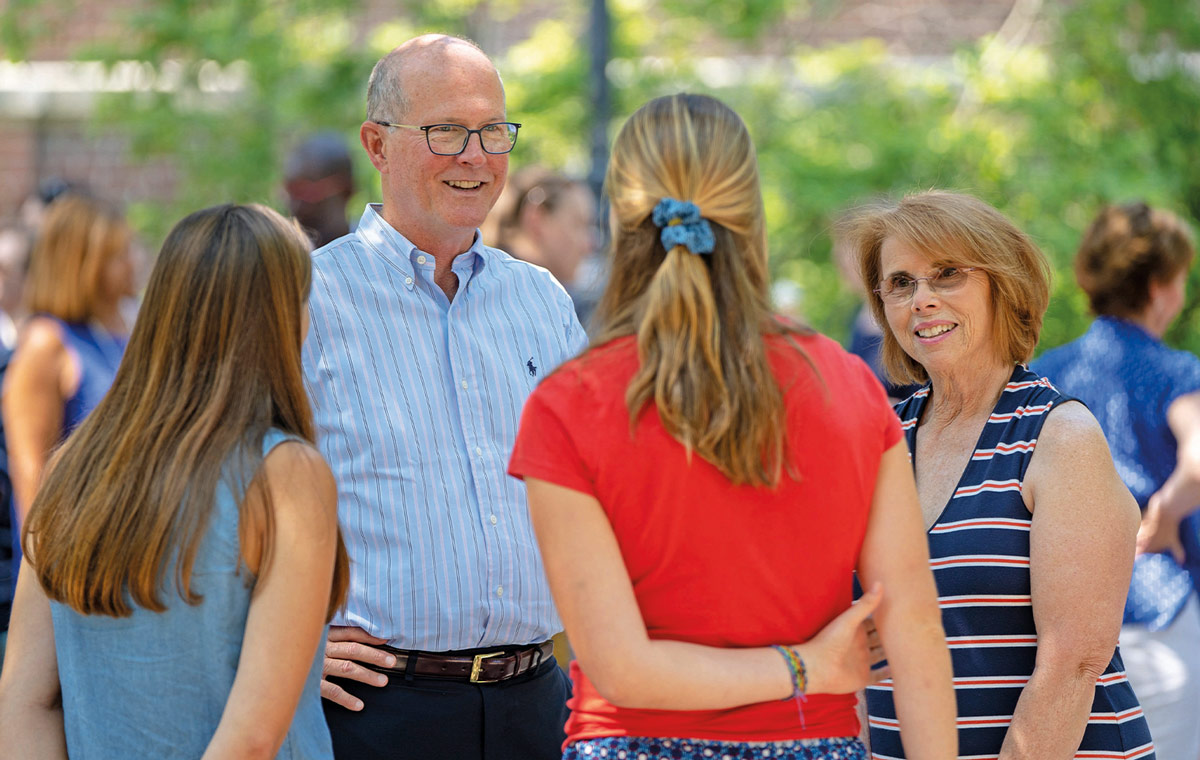
In one of the many interviews for the biggest job of his life, Jim Dean is deeply moved by the passion and pride of the members of the UNH presidential search committee.
“It wasn’t just what they said, but how. And I thought, ‘Wow, I’d really like to be part of this place.’”
At his previous institution, the University of North Carolina Chapel Hill, Dean worked his way up from associate professor of organizational behavior to the dean of the business school. Along the way, he kept listening and learning, writing books and leading teams. In 2013, he stepped into the role of executive vice chancellor and provost at UNC.
As president of UNH, he brought everything he’d learned on that journey: Working with students. Collaborating with faculty. Connecting with legislators. Navigating budgets.
“This was like the thesis project of my career,” he says.
During his tenure from 2018-2024, there was a global pandemic and a national racial reckoning. There was profound economic uncertainty and a shifting cultural perspective on the value of higher education. Every day, new challenges arrived in real time. Every day, he had to write a new rule book for what it means to lead now.
However, there were all these other moments too. A beautiful bicycle kick at a men’s soccer game. Too many slices of pizza at Holloway Commons dining hall. Talking about philosophy at French conversation get-togethers. Getting to know students and professors. Building bridges with state lawmakers and businesses.
He served for six years in the landscape of UNH, leaving a legacy in two different scales — the moments, and the history they add up to.
’Sic Tantum Bonum’
“All of us were humbly digging in on behalf of the community,” Dean says of the team’s collaboration. “We asked hard questions of each other but also respected each other’s expertise.”
With signature Wildcat innovation and gusto, the team of faculty and staff build a state-of-the-art COVID-19 testing lab that summer. The goal for the fall semester is to make it to Thanksgiving, after which the last few weeks of the semester will be online. Even with the testing lab up and running, nothing is a given.
It’s also a divisive time for public discourse. “There were two schools of thought on everything we did. The measures were either too strict or too lenient,” Dean says.
To help cope with the uncertainties, the COVID-19 leadership team develops a guiding expression: so far, so good. It’s an expression that illuminates a semester of the here and now. Success is small and measured. Despite all the planning and expertise, no one can predict the future.
The community makes it to Thanksgiving — a heartfelt milestone. So far, so good. However, the leadership team knows any expression worth its salt in higher education benefits from the gravitas of Latin. This is the translation: Sic tantum bonum.
At its peak, the campus testing lab processed more than 7,000 tests a day for the UNH community, as well as for New Hampshire long-term care facilities and K-12 public schools.
“We were all so worried all the time,” Dean says. “There was no resting on our laurels.”
And while the pandemic was an unprecedented challenge for faculty, staff and students, so far, so good and the work of the committee and the community yielded good outcomes: there was no significant campus-wide outbreak, and steadily classes resumed in the collective “new normal.”
Smart ‘Cats
It is August 2018. Sitting at a table in the tavern at the Three Chimneys Inn, two scholars engage in intellectual debate. They are Scott Smith, chair of the classics, humanities and Italian studies department, and Dean. Both of them are about to take on new roles: Smith as Faculty Senate chair and Dean as UNH president. They dive right into the big issues, emblematic of their partnership to come. The topic, Smith says, is “what a university ought to be.”
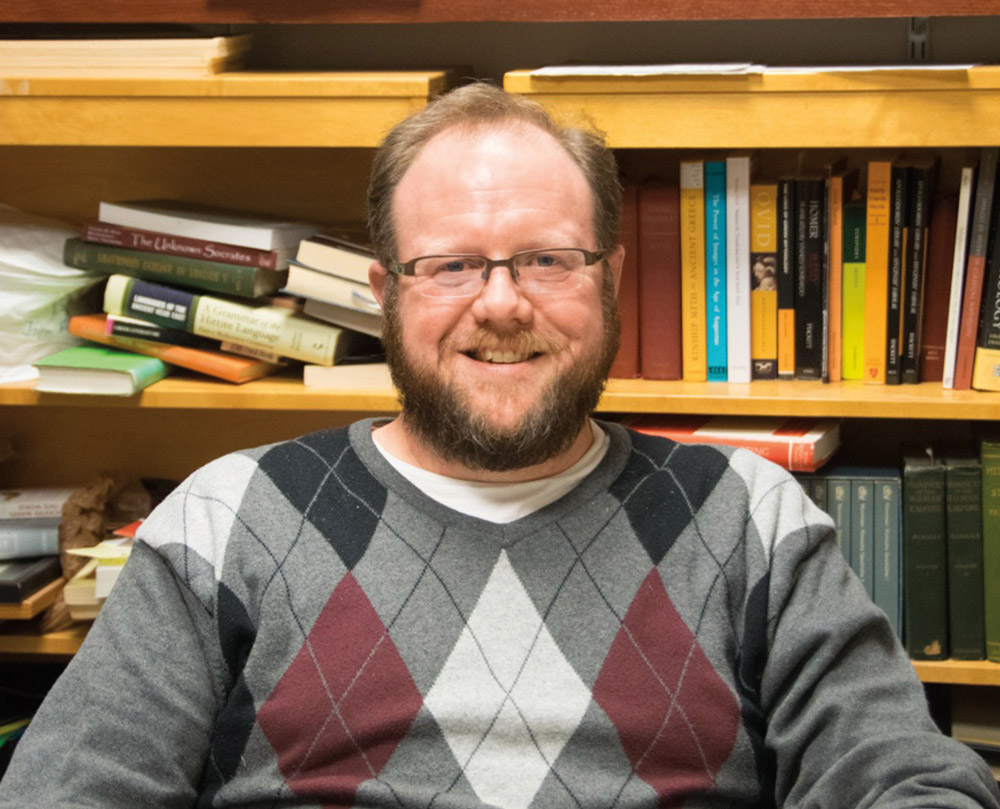
That fall, Dean introduces his vision to establish strategic priorities for the university, a kind of compass to steer UNH forward and measure its progress: enhancing student success and well-being, expanding academic and research excellence, embracing New Hampshire and building financial strength.
As the new Faculty Senate chair, Smith draws on his own institutional history and goodwill to navigate between faculty and university leadership (he’s been at UNH since 2000, then fresh out of graduate school). His senate role, Smith says, requires patience and diplomacy, or, on a lighter note, “herding a lot of very smart cats” and “being a cooperative thorn in the side of the administration” on behalf of the faculty.
There is a shared sense of hope in the air, an openness to new possibilities. “It’s great to be a new chair for the first year of a presidency,” Smith says.
Throughout the process of bringing the strategic priorities to life, respectful intellectual sparring continues to define the Dean-Smith partnership.
“We try to punch holes in each other’s intellectual positions,” Smith says. “And that’s what a university is all about.”
A Few of Dean’s Favorite Things
Favorite place on campus?
College Woods
Favorite part of your day?
Any meeting where we made progress on an issue. Progress made me happy. Also, the ringing of the Thompson Hall bells.
What surprised you about UNH?
I am surprised we don’t honor our history enough. I like to remind people of landmarks in our history. There’s power in our past.
Favorite UNH tradition?
Pat the ’cat.
Something everyone should know about UNH?
We are the biggest importer of talent in New Hampshire. We bring more people into the state’s workforce than anyone else by a wide margin.
Something important you learned from a student?
My first year, a young woman came to my Office Hours who had been diagnosed with a brain tumor. She left the university for treatment and came back to finish her degree. She told me her experience made her change her major and decide to become a nurse. I was struck by her level of grit and determination.
What about UNH will you take with you?
The community. People here support each other in a profound way.
What does it mean to be a Wildcat?
To be bold and ambitious and part of a strong group of people.
And he points to Dean as a kindred spirit who values the power of discussion and debate.
“A lot of smart conversations with a lot of smart people — that’s how things get better,” Smith says.
The Second Family
Among the guests are Jim and Jan Dean, both raising a glass to toast the happy couple.
Six years prior, Zamani arrived at a chaotic Boston Logan Airport, off a flight from her home country of Iran, for her first visit to the U.S. She was about to start her freshman year at UNH.
Through programs set up by the Office of International Students and Scholars (OISS), she met students from all over the world. Still, Zamani’s transition into the technical English required for her chemical engineering major proves immensely challenging. And soon, with tensions high between Iran and the U.S., she realized she won’t be able to see her family for some time.
Community surrounded her at UNH. Every step of the way, she encountered people “willing to help me in any way possible.”
One of those people is President Dean. In fall 2018, the two first connect at a World Cup viewing party at the Memorial Union Building — they are both huge soccer fans. As Dean meanders among the tables of students, he stops and chats with Zamani. He is curious about where she’s from and how she’s doing at UNH.
Dean bumped into Zamani a few months later at the dining hall, and soon after that, she invited the president to her presentation at OISS on funny sayings in Persian. When he showed up, “it was amazing for everyone,” she recalls.
Then she went to his office hours, where students can book one-on-one time to discuss any topic with the president. They talked about Iran, which she says Dean had read a lot about, but also how she was doing so far from home in a challenging global climate.
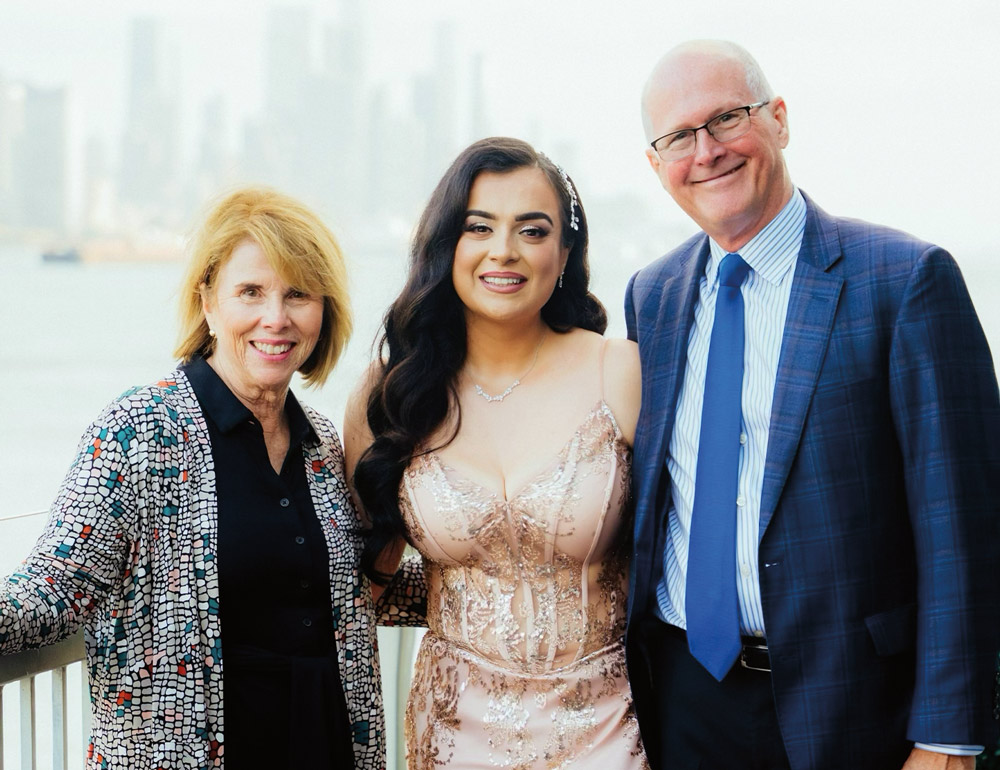
From left, Jan Dean, Shadi Zamani ’20 ’24G and Jim Dean at Zamani’s engagement party.
Zamani says making time for students is one of the best things Dean did as a leader.
“He was there for me, not just as president, but mentally,” she says.
When the pandemic made the last half of Zamani’s last semester remote, the president and wife Jan kept in touch to make sure she was OK. “They’re like my American family.” She navigated the stressors of finding a job, eventually landing on her feet as a consultant at Lonza, an international manufacturing company in the pharmaceutical, biotechnology and nutrition sectors.
She says Dean taught her vital lessons through his example, like how to approach people and be an active listener.
So it’s natural that her “American family” are here with her in the Big Apple for this milestone in her personal life. She cites their support as a big part of how she got where she is: earning her master’s at UNH Manchester before returning to her job at global healthcare manufacturing company Lonza and tying the knot.
The Bridge Builder
Morison’s grandfather sees potential. Potential in investment casting, the company’s 5,000-year-old metallurgical process that saw resurgence during World War II. And potential to bring new life to his home state’s sluggish postwar economy.
The company is Hitchiner Manufacturing, which today is a global powerhouse known for its technological innovation. John Morison is its CEO and chairman.
When the president of his alma mater reaches out about joining UNH’s inaugural Business Advisory Council (BAC), Morison agrees. Close to Morison’s heart is a priority his grandfather shared: workforce development. You simply can’t do what Hitchiner does — innovate in engineering on a global scale — without lots of smart people doing hard things.
The BAC is composed of leaders from the state’s varied industries, from craft brewing to finance. Morison says Dean essentially runs the council meetings as listening sessions. What the president resoundingly hears is: we need more engineers, we need more nurses, we need more marketers, we need more …
Hitchiner currently partners with the College of Engineering and Physical Sciences on internship opportunities that include robust mentorship and professional development.
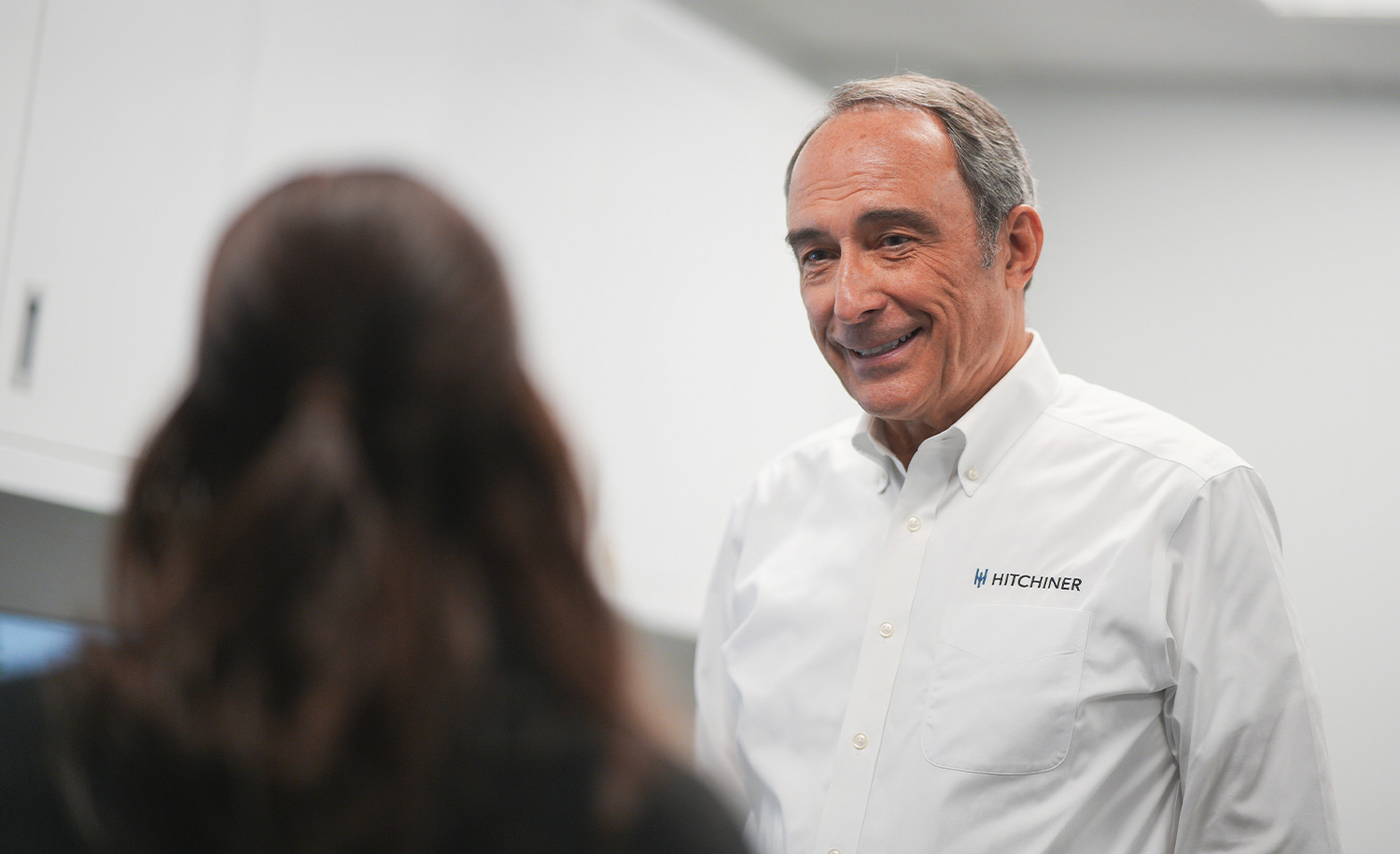
Morison says workforce development has improved in the state because of connections forged through the Business Advisory Council, but that there is still a lot of progress to be made. Above all, he admires Dean’s vision for taking collaboration with state businesses to “a whole new level” — starting with his willingness to partner directly with businesses to solve problems.
He cites Dean’s combination of business savvy and deep higher education expertise; he brings these two sectors together around shared goals, like workforce development and economic growth.
“He really bridges these two worlds,” Morison says.
The French Connection
It Is the spring of 2023, and Dean is attending one of the many university ceremonies that are part of the presidential pomp and circumstance. But this one is different: it’s driven by a personal passion and not at all by his title or position. He’s being inducted into UNH’s French Honor Society.
Five years prior, Assistant French Professor Ileana Chirila learned that Dean is a Francophile who reads French literature in the original. “It was a beautiful discovery,” she says. A friendship between Dean and the French program was born.
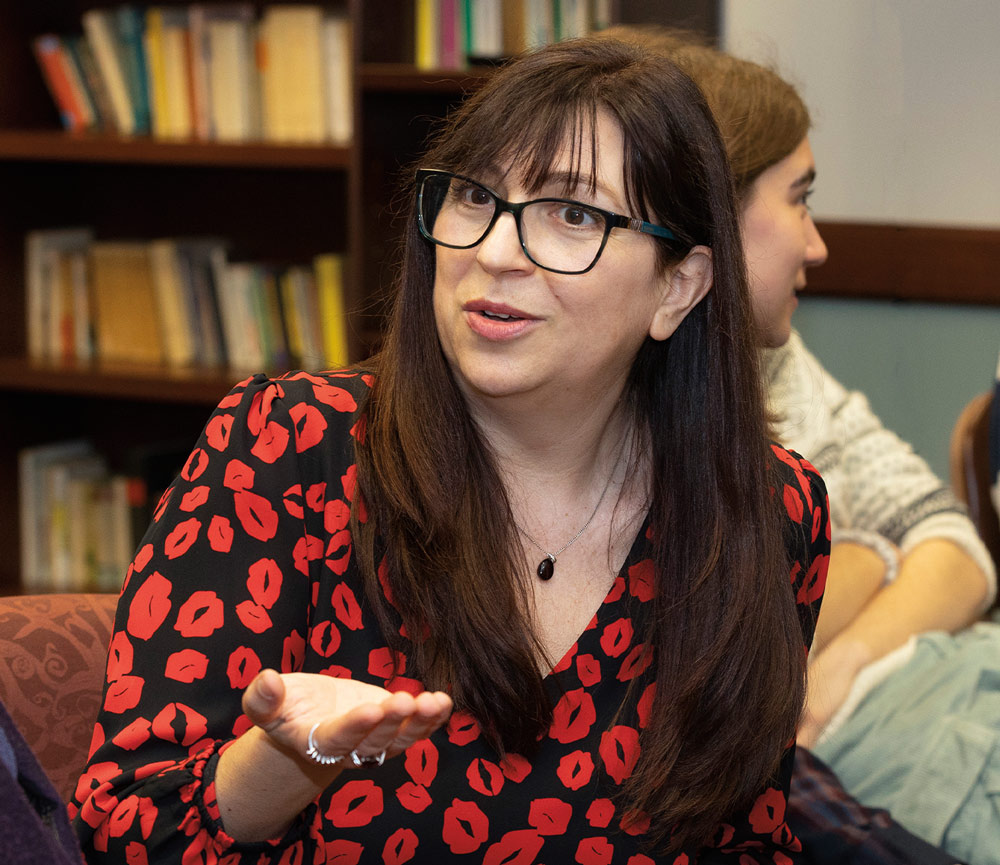
Dean’s first French Café is on Zoom. Chirila kept the fact of his attendance a secret, so when Dean popped up in a square on the screen, it was a bit surreal for everyone. His participation showed a certain vulnerability, she says. “Speaking in a second language puts you in a place of not knowing everything.” Soon, he isn’t just the president; he is part of a community that shares a love for French.
When Chirila reinvigorates the university’s chapter of the French Honor Society, Pi Delta Phi, she thinks of Dean immediately as a great fit for one of its honorary memberships: he is a diplomat for the importance of language education.
“UNH is ready to prepare students for a global world,” Chirila says. “And we can’t do this without languages.”
More Than a Game
Dean’s story, like the hockey game that moves him in that moment, is about collective victory: what individuals from a range of backgrounds can accomplish because of the spirit they share. The moments, the people, the students — those things, to Dean, are what UNH is all about, and it’s what being president of UNH is all about. Not just what he accomplished, but what he got to be part of.
But in the Whit, in the homestretch of his presidency, at what is likely to be his last UNH hockey game, the fan celebration surrounding him is a little bittersweet. “I just stood there and watched how happy people were.”